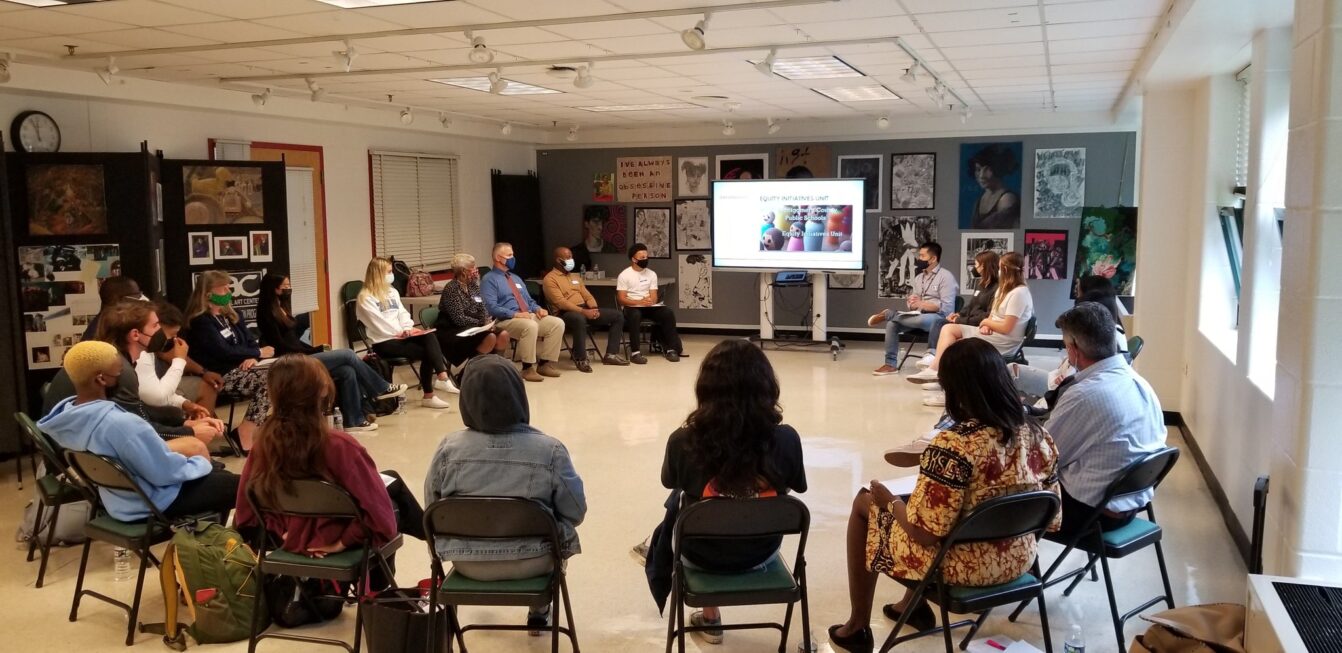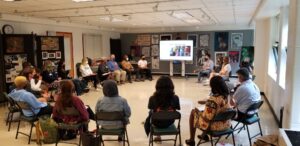Sherwood Takes Steps Towards Anti-Racist Initiatives

Apurva Mahajan ‘22

Sherwood and Einstein students participate in a group study circle on October 11, 2021
For the past year, MCPS has been conducting an Anti-Racist System Audit set to be complete in May 2022. As part of more frequent and continuing conversations about race in educational environments, Sherwood has been attempting to address bias and racism in schools as part of the larger county mandate. This effort has become more pressing due to Sherwood students’ recent involvement in racist and transphobic incidents directed at students from other schools.
Last year, all teachers at Sherwood participated in the MCPS Anti-Racist Survey for the county to gather data for the upcoming audit. Students also participated in a Student Voice survey in their social studies classes that asked them about what they knew about being anti-racist and about equity. The school used this feedback to talk to staff from the MCPS Equity Initiatives Office, who trained selected staff on anti-racism before this school year began.
“If nothing else, [the training] was about having those tough conversations, so that when we come back with students, when questions are being asked about race, that teachers aren’t going ‘I’m not going to have those conversations,’” said Principal Tim Britton.
Equity training runs from the county level to the school’s instructional leadership team, and teachers are on Professional Learning Committees (PLCs) based on individual content areas. “There are three levels of training: county training, content training, and in-staff focus,” explained Britton.
Last year in February, 20 Sherwood students were selected by teachers to participate in discussions called study circles. “We had students from each grade level that reflect the racial and ethnic diversity of our school,” said Staff Development Teacher Catina Wist. Although a school-wide implementation plan for study circles has not been decided, the school plans to hold them this school year in November or December.
Another major area of focus is emphasizing getting underrepresented minority students into AP level courses. “The AP PLC analyzes the transcripts of students with GPAs of 3.0 or higher who have not yet taken an AP course. This year we will share those names with teachers during recommendation time so that they can talk to the students,” said science resource teacher Gina Martin, who is a member of the AP PLC along with ESOL teacher Angelic Searles-Thompson. Students also have the opportunity to take the elective class AP Seminar, in which students who may be taking their first AP class learn the skills to succeed.
The Social Studies department is expanding their resources from the traditional curriculum with new books and materials that add more groups’ perspectives into the study of history. Students will also be offered choices on which perspective they want to learn more about in detail. “The U.S. history curriculum, and this is the first year it’s being taught, was written through an anti-racist lens,” said social studies resource teacher Christine McKeldin. “For example, we’re going to be giving a common writing task on the progressive movement, and usually we focus on the main part of the progressive movement … Now, the students have a choice of whose lens they want to look at the progressive movement: women, African Americans, Mexican Americans, and Native Americans, [and explore] how did the progressive movements affect their causes.”We couldn’t be any more excited to be given this green light to really open up perspectives and dive into some of this stuff that before, we may not have had the platform to do it.”
On a more community-focused scale, students are taking anti-racism and equity into their own hands. “I’m a part of BSU because I think the more we talk about peoples’ bias and irrational thoughts, the more we can get rid of it because you only realize you have a problem once you start acknowledging it from the beginning,” said senior Christian Maffei, who is president of Sherwood’s Black Student Union. “BSU is volunteering at the nearby Slave Museum and hosting field trips to educate people about real things that actually happened to Black people, because the more people learn about real events, the more they can grow,” said Maffei. The club hosts open discussions on current events and important issues that the members face in their day to day lives because of racial discrimination.